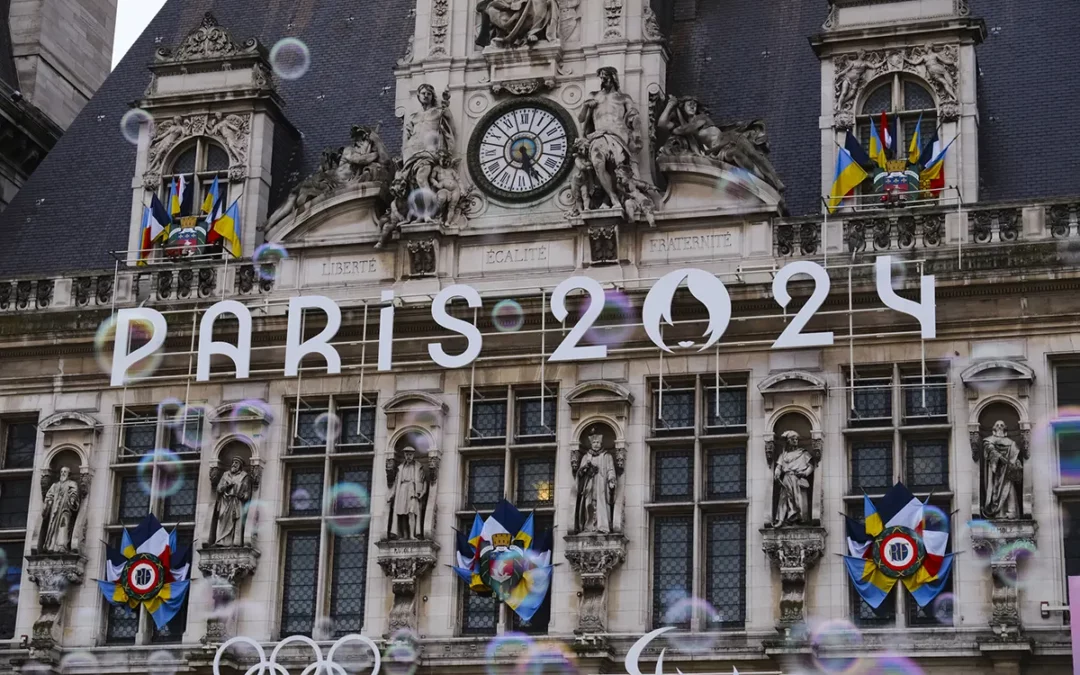The Paris 2024 Olympics are just around the corner. While around 10,500 athletes are getting ready for the competition of their lives with billions of people set to tune in to watch, scammers are stepping up their game too. From bogus ticket websites to sophisticated deepfake scams, fraudsters are looking to take advantage of the Olympic buzz.
In this post, we’ll highlight the top scams to watch out for and give you tips on how to avoid them and stay safe.

Fake Ticket Websites
Beware of websites selling bogus tickets for the Olympics because any purchases made on such websites are highly likely to lead to financial loss and significant disappointment. What’s tricky, however, is that these fake websites often appear quite legitimate. Here’s an example of one such website, paris24tickets[.]com:

Fake ticket website (1/2). Source

Fake ticket website (2/2). Source
Unfortunately, even the family of UK Olympic swimmer Matt Richards was recently scammed out of over $3,000 when they fell for a fake ticket website, only discovering that it was a scam when they noticed spelling mistakes and grammatical errors in follow-up communications from the website.
Please watch out for such websites and know that the only way to purchase tickets for the 2024 Olympic and Paralympic Games is via the official ticketing website, https://tickets.paris2024.org/
If you’re not sure if a website is legitimate, enter the URL into the Trend Micro Site Safety Center to find out for sure. However, here are some other things to keep in mind:
- Check if it’s secure. Look for the padlock symbol. Although its presence is not a guarantee that the website is safe, if it’s missing, it’s a sure sign that it’s not.
- Research online to gather information that allows you to confirm its legitimacy.
- Look out for:
- Unexpected pop-ups or ads, or anything that may seem odd or suspicious, such as an out-of-date logo.
- Spelling/grammar errors, which are common on fake websites.
- No reviews or contact information (phone number, address, email).
- Unbelievable deals that are simply too good to be true.
Fake Olympics Streaming Websites
There are many ways to watch legitimate coverage of the Olympics, both on TV and via streaming services. However, that isn’t going to stop scammers from creating their own fake Olympics streaming websites to try to trick people into sharing their personal data.
These fake streaming websites will most often have suspicious domain names, such as watcholympicslivehd24[.]com and olympic.watchliveandfree[.]xyz. Their goal, just like with the fake social media giveaways, is to collect people’s personal information.
The fake streaming website example below even asks the user to input their credit card information, claiming that it won’t be charged.

Fake streaming website. Source
Of course, that almost certainly won’t be the case — the scammers will likely use the information to make fraudulent online purchases and potentially distribute or sell it on the dark web.
To ensure that you don’t inadvertently share your personal and/or financial information with scammers, make sure to watch coverage of the Olympics only via well-known and trusted TV networks and streaming services. Research first and verify!
Deepfake Scams
Deepfakes use artificial intelligence to create realistic but fake videos of people, making it appear as if they are saying or doing things they never actually did. Recently, deepfake technology has become alarmingly sophisticated, allowing scammers to impersonate others convincingly on video calls. Earlier this year, a finance worker in Hong Kong was tricked into transferring over $25 million. Scammers, using deepfake technology, posed as the company’s chief financial officer and other employees during a video conference call. Despite initial suspicions, the worker was persuaded by the realistic appearance and voices of his supposed colleagues, leading him to proceed with the substantial transfer.
With social media more popular now than ever before, there’s concern that scammers might exploit deepfake technology to mimic Olympic athletes and officials, potentially defrauding fans by persuading them to send money or cryptocurrency. The real-time application of this technology on video calls adds to its deceptive potential, as evidenced by the unfortunate incident with the Hong Kong finance worker.
Below are some general tips for spotting deepfakes:
- Check for unnatural movements: Look for awkward or jerky movements that seem out of place.
- Watch the eyes and mouth: Deepfakes often struggle with realistic blinking and natural mouth movements.
- Listen for audio issues: Mismatched audio and video can be a sign of a deepfake.
- Examine the lighting: Inconsistencies in lighting and shadows can indicate manipulation.
- Trust your instincts: If something feels off or too good to be true, it might be a deepfake.

Deepfakes: How to spot them
Source: CBC Kids News
Fake Social Media Giveaways
To celebrate the Olympics, legitimate companies launch social media giveaways, offering prizes like live event tickets or top-of-the-line TVs to improve the at-home viewing experience. However, alongside these genuine promotions, scammers also host their own fraudulent contests. In these deceptive giveaways, there will be no winners — the aim is just to harvest personal information from unsuspecting participants. Below is a screenshot of such a scam from the Tokyo Olympics.

Fake social media giveaway. Source
Notice the registration link in the post — this will almost always lead to a website with a form that prompts you to input your personal details. Once you submit your information, it will be sent straight to the scammers, who could use it to launch phishing attacks against you or distribute or sell it on the dark web.
Before entering a social media giveaway, and especially if you are suspicious, don’t click on any links. Always research first and verify its legitimacy by visiting the company’s official social media account or website. Remember, if it sounds too good to be true, it’s probably a scam!

Dangerous Public Wi-Fi
If you’re lucky enough to be heading to Paris to watch the Games live, it’s important to be aware of the risks of using public Wi-Fi. Many public Wi-Fi networks lack strong security protections, so they are prime targets for scammers. If you connect to a public Wi-Fi network that has been compromised, scammers could intercept your personal and financial information and even install malicious software on your device to steal details like your login credentials. This would leave you vulnerable to becoming a victim of fraud and identity theft.
When it comes to safely using public Wi-Fi, the best thing you can do is use a VPN. A VPN will create an encrypted tunnel between your device and the public Wi-Fi network, ensuring that nobody can intercept any of the information transmitted. In the absence of a VPN, if you have to use a public Wi-Fi network, follow these tips:
- Verify the network you are connecting to before joining.
- Don’t access financial accounts or make transactions.
- Only visit secure sites with HTTPS and a padlock symbol.
- Turn off Wi-Fi when not in use to prevent unauthorized access.
- Disable auto-connect to Wi-Fi networks (network settings on your device).
- Keep your devices and security software up-to-date.
- Use strong passwords and 2FA to protect your personal information and accounts.

Stay Safe and Enjoy the Games
As we look forward to the spectacle of the Paris 2024 Olympics, remember to keep your guard up against scams. Whether you’re heading to Paris or watching from home, stay alert, stay safe, and enjoy the Games to the fullest! Here’s to an unforgettable and secure Olympic experience!
If you’ve found this article an interesting or helpful read, please SHARE it with friends and family to help keep the online community secure and protected.

Avril Ronan is Global Program Manager of the Internet Safety for Kids and Families Program at Trend Micro. Avril is best known for working in community; engaging students, parents, educators and senior citizens in the conversation about online safety. The ultimate goal of each conversation is to empower people to be online in safe, responsible and successful ways. As a regular public speaker, Avril collaborates with academia, law enforcement, industry and government having coordinated and delivered programs to date around the world such as What’s Your Story?, Cyber Academy (now in 19 languages), and the #StayAtHome
Webinar Series.
